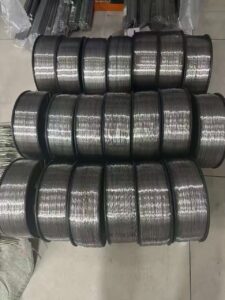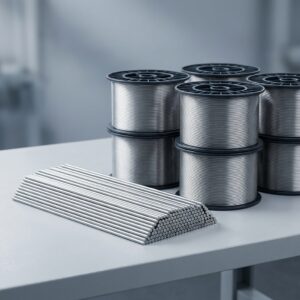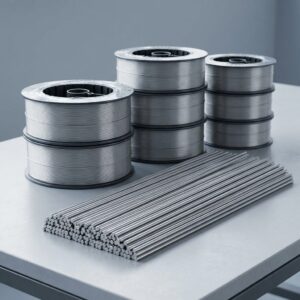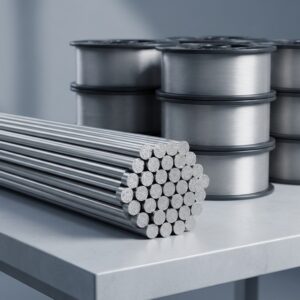Overview
Titanium wire TA1 is a highly sought-after material in various industrial sectors due to its exceptional properties and versatility. Renowned for its remarkable strength-to-weight ratio, corrosion resistance, and ability to withstand extreme temperatures, this titanium alloy has become an indispensable component in numerous applications. In this comprehensive guide, we will delve into the intricacies of titanium wire TA1, exploring its composition, characteristics, and diverse range of applications.
Composition and Properties
Titanium wire TA1 is an alpha-beta titanium alloy composed primarily of titanium, aluminum, and vanadium. This unique composition bestows upon it a remarkable combination of properties that sets it apart from other materials. Let’s take a closer look at some of its standout characteristics:
- Exceptional Strength: Titanium wire TA1 boasts an impressive tensile strength, making it an ideal choice for applications that demand high load-bearing capabilities. This strength is derived from the strategic addition of aluminum and vanadium to the titanium matrix, which enhances its mechanical properties without compromising its lightweight nature.
- Corrosion Resistance: One of the defining features of titanium wire TA1 is its outstanding resistance to corrosion. This characteristic is attributed to the formation of a stable, passive oxide layer on the surface of the material, which acts as a protective barrier against various corrosive environments, including saltwater, acids, and alkaline solutions.
- High Temperature Tolerance: Titanium wire TA1 can withstand extreme temperatures, both hot and cold, without compromising its structural integrity. This thermal stability makes it an excellent choice for applications involving high-temperature processes or environments, such as aerospace and automotive industries.
- Biocompatibility: Due to its inert nature and resistance to corrosion, titanium wire TA1 is highly biocompatible, making it a popular choice for medical implants and surgical instruments, where it minimizes the risk of adverse reactions or tissue rejection.
Applications
The unique properties of titanium wire TA1 have enabled its widespread use across various industries, each capitalizing on its distinct advantages. Here are some of the key applications:
- Aerospace Industry: Titanium wire TA1 finds extensive use in the aerospace sector, where its high strength-to-weight ratio and temperature resistance are crucial. It is employed in the construction of aircraft components, such as engine parts, airframe structures, and fasteners, contributing to improved fuel efficiency and reduced weight.
- Automotive Industry: The automotive industry has embraced titanium wire TA1 for its ability to enhance performance and efficiency. It is utilized in the production of high-performance engine components, exhaust systems, and suspension components, where its lightweight and high-temperature tolerance provide significant advantages.
- Medical and Dental Applications: The biocompatibility of titanium wire TA1 makes it an ideal material for medical and dental applications. It is commonly used in surgical instruments, implants, and orthodontic wires, ensuring minimal risk of adverse reactions and promoting faster healing processes.
- Chemical Processing Industry: The exceptional corrosion resistance of titanium wire TA1 renders it suitable for use in the chemical processing industry, where it is employed in the construction of piping systems, heat exchangers, and reaction vessels, enabling safe and efficient handling of corrosive substances.
- Marine and Offshore Applications: Titanium wire TA1 is highly resistant to saltwater corrosion, making it a preferred choice for marine and offshore applications, such as desalination plants, ship components, and offshore oil and gas platforms.
- Sports and Recreation: The lightweight and high-strength properties of titanium wire TA1 have made it a popular material in the sports and recreation industry. It is used in the production of high-performance bicycles, golf clubs, and other sporting equipment, providing enhanced performance and durability.
Manufacturing Processes
Titanium wire TA1 is typically manufactured through various processes, each tailored to meet specific requirements and ensure optimal performance. Some of the common manufacturing techniques include:
- Cold Drawing: In this process, a titanium rod is pulled through a series of dies, gradually reducing its diameter and increasing its length, resulting in a wire with exceptional tensile strength and uniformity.
- Hot Extrusion: Titanium billets are heated and forced through a die to produce wire with consistent cross-sectional dimensions and enhanced mechanical properties.
- Powder Metallurgy: This process involves compressing and sintering titanium powder to create a wire with unique characteristics, such as porosity or controlled alloying composition.
- Surface Treatments: Titanium wire TA1 can undergo various surface treatments, including anodizing, nitriding, or coating, to enhance specific properties like wear resistance, lubricity, or electrical conductivity, tailoring it for specialized applications.
Environmental Impact and Sustainability
Titanium wire TA1 is not only renowned for its exceptional performance but also for its environmentally friendly nature. Titanium is a highly recyclable material, and the manufacturing processes involved in producing titanium wire TA1 have a relatively low environmental impact compared to other metals. Moreover, the corrosion resistance and long service life of titanium wire TA1 contribute to reduced waste and energy consumption, further enhancing its sustainability credentials.
Quality Control and Testing
To ensure the consistent quality and performance of titanium wire TA1, rigorous testing and quality control measures are implemented throughout the manufacturing process. These tests may include:
- Mechanical Testing: Tensile strength, hardness, and ductility tests are conducted to verify the mechanical properties of the wire, ensuring it meets the required specifications.
- Metallographic Analysis: Microscopic examination of the wire’s microstructure is performed to assess its metallurgical characteristics and identify any potential defects or inconsistencies.
- Chemical Composition Analysis: Analytical techniques, such as X-ray fluorescence (XRF) or mass spectrometry, are employed to verify the chemical composition of the wire, ensuring it falls within the specified alloy range.
- Non-Destructive Testing: Methods like ultrasonic testing, eddy current testing, or radiographic inspection are used to detect any internal flaws or discontinuities in the wire without compromising its integrity.
Future Developments and Innovations
As technology continues to evolve, the demand for advanced materials with exceptional properties is constantly increasing. Researchers and material scientists are continuously exploring new alloy compositions and manufacturing techniques to further enhance the capabilities of titanium wire TA1. Some areas of focus include:
- Improved Strength and Ductility: Ongoing research aims to develop titanium alloys with even higher strength and ductility, enabling the production of wires that can withstand greater loads and deformations without compromising their structural integrity.
- Enhanced Corrosion Resistance: Efforts are underway to develop titanium alloys with superior corrosion resistance, expanding their applications in highly corrosive environments, such as offshore oil and gas operations or chemical processing.
- Additive Manufacturing: The integration of additive manufacturing techniques, such as wire-based 3D printing, could revolutionize the production of complex titanium wire components, opening up new possibilities in various industries.
- Surface Engineering: Advancements in surface engineering techniques, such as plasma nitriding or ceramic coatings, could further improve the wear resistance, lubricity, and functional properties of titanium wire TA1, tailoring it for specialized applications.
Frequently Asked Questions (FAQs)
- What is the difference between titanium wire TA1 and other titanium alloys? Titanium wire TA1 is an alpha-beta titanium alloy specifically designed for its high strength, corrosion resistance, and temperature tolerance. While other titanium alloys may excel in certain areas, TA1 offers a well-balanced combination of properties suitable for a wide range of industrial applications.
- Is titanium wire TA1 expensive? Compared to some other materials, titanium wire TA1 is relatively expensive due to the cost of raw materials and the specialized manufacturing processes involved. However, its exceptional performance and longevity often justify the initial investment, making it a cost-effective solution in the long run.
- Can titanium wire TA1 be welded? Yes, titanium wire TA1 can be welded using various techniques, such as gas tungsten arc welding (GTAW) or electron beam welding. However, special precautions and procedures must be followed to ensure proper welding and prevent contamination or degradation of the material’s properties.
- Is titanium wire TA1 magnetic? No, titanium wire TA1 is non-magnetic, making it suitable for applications where magnetic interference needs to be minimized, such as in certain medical devices or aerospace components.





